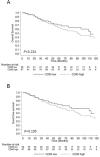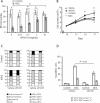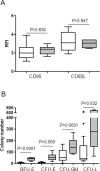APG101 efficiently rescues erythropoiesis in lower risk myelodysplastic syndromes with severe impairment of hematopoiesis
- PMID: 26910909
- PMCID: PMC4924760
- DOI: 10.18632/oncotarget.7469
APG101 efficiently rescues erythropoiesis in lower risk myelodysplastic syndromes with severe impairment of hematopoiesis
Abstract
CD95, a member of the death receptor family initiates a caspase-dependent apoptosis, when activated by its ligand CD95L, thought to negatively regulate erythrocyte production in the bone marrow. We have previously shown that CD95 is overexpressed in two thirds of patients with a lower risk myelodysplastic syndrome (MDS) and that resistance to erythropoiesis-stimulating agents (ESA) is linked to poor residual erythropoiesis. In the present study, we show that CD95 overexpression and previous transfusion are independent predictive factors of ESA resistance. To investigate an alternative therapeutic strategy of anemia in ESA-resistant patients, we have conducted a preclinical study of the effects of APG101, a fusion protein consisting of the extracellular domain of human CD95 and the Fc region of human IgG1 on MDS erythropoiesis in vitro. APG101 increases the number of burst-forming unit-erythroid (BFU-E) progenitors derived from CD34+ progenitors in liquid culture and improves overall proliferation rate of erythroid precursors by inhibiting apoptosis. APG101 rescues BFU-E growth in MDS patients presenting with attrition of erythroid progenitors at baseline, independently of CD95 or CD95L expression level. Our data show that overexpression of CD95 at diagnosis is a hallmark of ESA resistance and that severe impairment of erythropoiesis is predictive of erythroid response to APG101 in vitro. These data provide a rationale for further clinical investigation of APG101 in an attempt to treat anemia in lower risk MDS patients.
Keywords: CD95; CD95 ligand; anemia; erythropoiesis; myelodysplastic syndromes.
Conflict of interest statement
Anna Raimbault, Celine Deudon, Cecile Pierre-Eugene, Lise Willems, Nicolas Chapuis, Stephanie Mathis, Alexandra Rouquette, Olivier Kosmider, Valerie Bardet have nothing to disclose. Claudia Kunz, and Harald Fricke are APOGENIX employees. Michaela Fontenay received research funding from APOGENIX.
Figures





References
-
- Krammer PH, Behrmann I, Daniel P, Dhein J, Debatin KM. Regulation of apoptosis in the immune system. Curr Opin Immunol. 1994;6:279–289. Review. - PubMed
-
- De Maria R, Zeuner A, Eramo A, Domenichelli C, Bonci D, Grignani F, Srinivasula SM, Alnemri ES, Testa U, Peschle C. Negative regulation of erythropoiesis by caspase-mediated cleavage of GATA-1. Nature. 1999;401:489–493. - PubMed
-
- Claessens YE, Bouscary D, Dupont JM, Picard F, Melle J, Gisselbrecht S, Lacombe C, Dreyfus F, Mayeux P, Fontenay-Roupie M. In vitro proliferation and differentiation of erythroid progenitors from patients with myelodysplastic syndromes: evidence for Fas-dependent apoptosis. Blood. 2002 Mar 1;99:1594–601. - PubMed
-
- Claessens YE, Park S, Dubart-Kupperschmitt A, Mariot V, Garrido C, Chrétien S, Dreyfus F, Lacombe C, Mayeux P, Fontenay M. Rescue of early-stage myelodysplastic syndrome-deriving erythroid precursors by the ectopic expression of a dominant-negative form of FADD. Blood. 2005 May 15;105:4035–42. - PubMed
MeSH terms
Substances
LinkOut - more resources
Full Text Sources
Other Literature Sources
Medical
Research Materials
Miscellaneous

